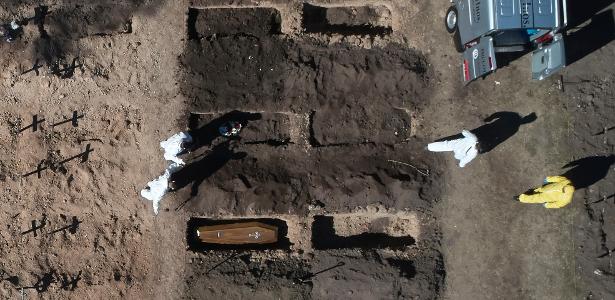
[ad_1]
Argentine President Alberto Fernández announced that, with the exception of two cities, Argentina will officially leave social isolation, considered the longest in the world. Fernández asked the population to maintain protection efforts and not relax in care, just when he was criticized for having organized the wake of Diego Maradona without distance or social protection.
“We found that, in the last two weeks, the number of cases has been reduced by approximately 30% in the country. We will maintain social isolation in only two cities: Bariloche and Puerto Deseado (both in Patagonia). President Alberto Fernández announced, stressing that “the population must continue with the effort because the problem of the pandemic has not been overcome.”
The Argentines’ request to continue their efforts came on Friday night, a day after the gigantic popular gatherings around the wake of former player Diego Maradona, organized by the government itself.
The ceremony, in which about a million people did not maintain social distance or protective attention, led the opposition to criminally denounce President Alberto Fernández for promoting the spread of the coronavirus.
“The images that we saw of the wake are the ones that we must avoid. Of course, they are an epidemiological risk whose impact we will see in seven or ten days,” criticized the Minister of Health of Buenos Aires, Fernán Quirós.
It was the turn of the interior
The announcement of the end of the quarantine applies to ten of the 24 Argentine provinces, the majority in the interior. In the metropolitan area of Buenos Aires, the end of the so-called “eternal quarantine” began on November 9, after 233 days of isolation.
The end of the quarantine, however, did not end the restrictions. Public transport, for example, remains exclusive for activities considered essential.
The extension of the quarantine helps to understand the dramatic fall in popularity of Alberto Fernández, who in March had a positive image of 67.8% and now has 32.4%, according to the consulting firm Giacobbe & Asociados.
“It is a dizzying process of disillusionment,” says political analyst Jorge Giacobbe, author of the study, the most recent published this week.
“The numbers indicate that the quarantine no longer made sense. The mistake was to use quarantine as the only resource to control the pandemic. The government ran out of space to continue with the confinement, while the cases only increase ”, says the analyst.
The study also indicates that 64.2% of Argentines agree with the change from isolation to social distance. “We Argentines are exhausted. Social fatigue after eight months has reached its limit. The rational phase of the quarantine ended months ago,” concludes Giacobbe.
Hold the vaccine
The president also outlined the country’s new goal in relation to the pandemic: vaccinate as many people as possible between January and March, when fall begins.
“We have the advantage of seeing what happens with the pandemic in the northern hemisphere. A second wave with a really alarming number of infections. It is very possible that Argentina will face a second wave. So, the more attention we have, the easier it will be to face it. ”Fernández compared.
To avoid this European mirror, Argentina intends to vaccinate 13 million people.
“When March arrives we want all risk groups to be vaccinated. The total number of people that we must vaccinate between January and March is 13 million people, about 25% of Argentines. This is the effort that we must face now, ”said the president.
After March, vaccination will continue with those who are not at risk. The vaccine will be free for the population, but not mandatory.
“I invite you all to be part of this epic that is taking care of health. We will need about 20 thousand volunteers. Argentina, with maximum effort, can vaccinate between 4.5 and 5 million per month ”, calculated Fernández.
Despite the longest and most rigid quarantine in the world, Argentina is the ninth country with the most cases, even when it is one of the least proven. There are 1,407 million people infected and 38,216 dead.
In relation to its population, it ranks 23rd, worse than Brazil (28th), Peru (30th) and Chile (32nd), South American countries with the highest rate of cases. In relation to its population, Argentina occupies the eighth position in number of deaths. Peru appears in third place and Brazil, in eleventh.